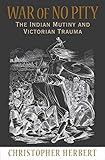War of No Pity : The Indian Mutiny and Victorian Trauma / Christopher Herbert.
Material type: TextPublisher: Princeton, NJ : Princeton University Press, [2021]Copyright date: ©2007Description: 1 online resource (352 p.) : 8 halftonesContent type:
TextPublisher: Princeton, NJ : Princeton University Press, [2021]Copyright date: ©2007Description: 1 online resource (352 p.) : 8 halftonesContent type: - 9781400832767
- LITERARY CRITICISM / European / English, Irish, Scottish, Welsh
- Abbot, Major
- Achaia
- Amalekites
- American Civil War
- Balaclava
- Barrackpore
- Bentham, Jeremy
- Board of Control for India
- Bosch, Hieronymus
- Bush administration
- Calvinism
- Carnell, Jennifer
- Chartism
- Chuckerwallah Kothie
- Coopland, Reverend
- Danton, Georges Jacques
- Dostoyevsky, Fyodor
- Euphrates
- Evangelicalism
- Frazer's Magazine
- Futtehgur
- Great Exhibition
- Heisenberg Uncertainty Principle
- Highlanders
- Ironsides
- Islam
- Jews
- Kipling, Rudyard
- Lahore Chronicle
- Manchester Guardian
- Mephistopheles
- ancien rgime
- anti-Victorianism
- atavism
- caste system
- concentration camps
- determinism
- diabolism
- disillusionment
- escape narratives
- executions
- fanaticism
- femininity
- feudalism
- gallows
- genocide
- globalization
- imperialism
- instinct
- jingoism
- mutilation
- 823/.809358 22
- online - DeGruyter
| Item type | Current library | Call number | URL | Status | Notes | Barcode | |
|---|---|---|---|---|---|---|---|
 eBook
eBook
|
Biblioteca "Angelicum" Pont. Univ. S.Tommaso d'Aquino Nuvola online | online - DeGruyter (Browse shelf(Opens below)) | Online access | Not for loan (Accesso limitato) | Accesso per gli utenti autorizzati / Access for authorized users | (dgr)9781400832767 |
Frontmatter -- CONTENTS -- List of Illustrations -- Acknowledgments -- INTRODUCTION. Jingoism, Warmongering, Racism -- CHAPTER ONE. Diabolical Possession and the National Conscience -- CHAPTER TWO. Three Parables of Violence -- CHAPTER THREE. The Culture of Retribution: Capital Punishment, Maurice Dering, Flotsam -- CHAPTER FOUR. The Mutiny in Victorian Historiography -- CHAPTER FIVE. The Infernal Kingdom of A Tale of Two Cities -- CHAPTER SIX. Lady Audley's Secret: The Mutiny, the Gothic, and the Feminine -- EPILOGUE. Fiction Fair and Foul: Novels of the Mutiny -- Notes -- Works Cited -- Index
restricted access online access with authorization star
http://purl.org/coar/access_right/c_16ec
On May 11, 1857, Hindu and Muslim sepoys massacred British residents and native Christians in Delhi, setting off both the whirlwind of similar violence that engulfed Bengal in the following months and an answering wave of rhetorical violence in Britain, where the uprising against British rule in India was often portrayed as a clash of civilization and barbarity demanding merciless retribution. Although by twentieth-century standards the number of victims was small, the Victorian public saw "the Indian Mutiny" of 1857-59 as an epochal event. In this provocative book, Christopher Herbert seeks to discover why. He offers a view of this episode--and of Victorian imperialist culture more generally--sharply at odds with the standard formulations of postcolonial scholarship. Drawing on a wealth of largely overlooked and often mesmerizing nineteenth-century texts, including memoirs, histories, letters, works of journalism, and novels, War of No Pity shows that the startling ferocity of the conflict in India provoked a crisis of national conscience and a series of searing if often painfully ambivalent condemnations of British actions in India both prior to and during the war. Bringing to light the dissident, disillusioned, antipatriotic strain of Victorian "mutiny writing," Herbert locates in it key forerunners of modern-day antiwar literature and the modern critique of racism.
Mode of access: Internet via World Wide Web.
In English.
Description based on online resource; title from PDF title page (publisher's Web site, viewed 24. Aug 2021)


